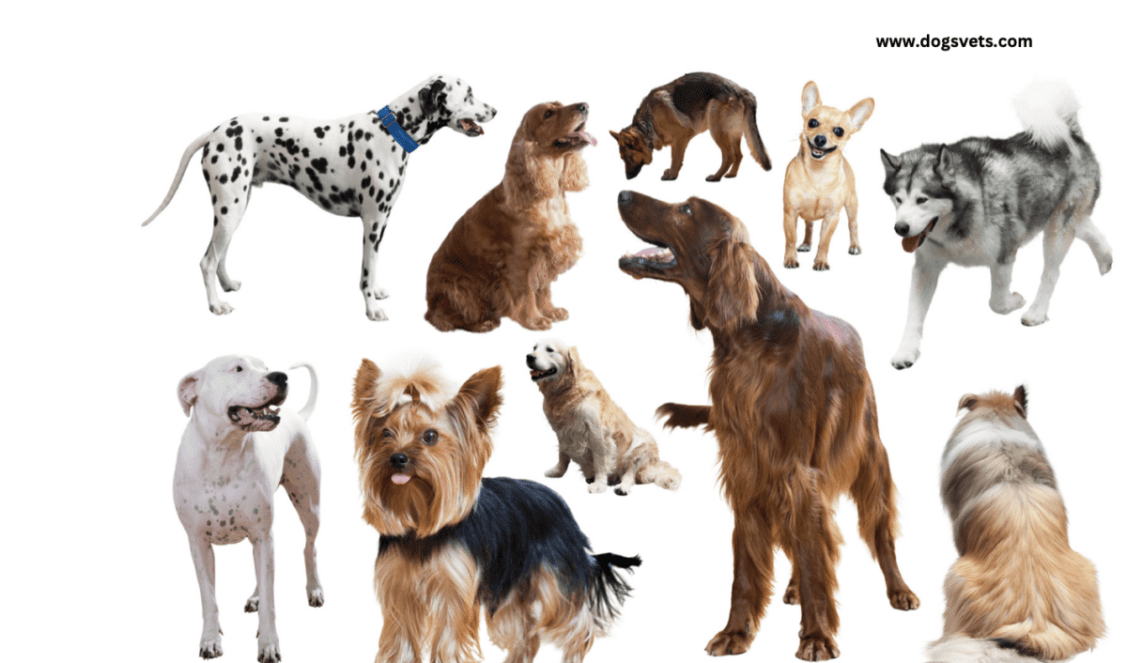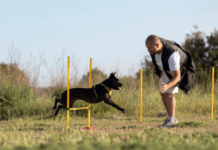Last Updated on January 4, 2023 by Dogs Vets
Dog Breeding For Beginners + 10 important facts to consider
Dog breeding is the practice of intentionally mating two dogs with the goal of producing offspring that exhibit specific desired characteristics.
This can be done for a variety of reasons, such as to preserve or improve upon a particular breed, to produce dogs with specific traits for work or competition, or simply as a hobby.
In order to breed dogs successfully, breeders must have a deep understanding of canine genetics and breeding principles, as well as the characteristics and needs of the specific breed they are working with.
They must also be committed to the responsible care and welfare of the dogs involved in the breeding process, including both the parents and the offspring.
It can be a rewarding and challenging experience for those who are passionate about dogs, but it is important to do thorough research and be prepared for the responsibilities that come with it.
Before you consider breeding dogs, it is important to understand the basics of genetics and how traits are inherited. This will help you make informed decisions about which dogs to breed and how to produce healthy, well-adjusted puppies.
In addition to understanding genetics, it is also important to be familiar with the breed standards for the specific breed you are breeding.

Breed standards are guidelines that describe the ideal characteristics, temperament, and appearance of a particular breed. These standards are established by breed clubs and are used to evaluate dogs in confirmation shows.
Another important consideration when breeding dogs is the health of the breeding animals.
Both the sire and dam should be screened for inherited health conditions and should be in good physical condition.
It is also important to follow responsible breeding practices, such as only breeding from dogs that are of appropriate age and limiting the number of litters a dam has over its lifetime.
When it comes time to find homes for the puppies, it is important to be selective and ensure that they are going to responsible and loving owners. This may involve screening potential adopters and providing education about the breed and proper care for the puppies.
Breeding dogs can be a rewarding and fulfilling experience, but it is important to be well-informed and prepared for the responsibilities that come with it.
By doing a thorough research and following responsible breeding practices, you can help ensure that you are producing healthy, well-adjusted puppies and placing them in loving homes.
10 important facts to consider when breeding dogs
- Dog breeding is the practice of mating selected dogs with the intention of producing offspring with specific traits.
- Genetics plays a significant role in dog breeding, as certain traits and characteristics are inherited from the parents.
- Breed standards are guidelines that describe the ideal characteristics, temperament, and appearance of a specific breed.
- It is important to carefully consider the health and temperament of the breeding dogs, as these traits can be passed on to the puppies.
- Responsible breeding practices involve screening for inherited health conditions, only breeding from dogs of appropriate age, and limiting the number of litters.
- Not all dogs are suitable for breeding, and it is important to carefully evaluate the potential breeding animals to ensure they meet breed standards and are healthy.
- It is important to be selective when finding homes for puppies and ensure they are going to responsible and loving owners.
- Breeding dogs requires a significant time and financial commitment, as there are many costs associated with breeding and raising a litter of puppies.
- There are various organizations and resources available for those interested in breeding dogs, such as breed clubs and mentor programs.
- It is important to be well-informed and prepared for the responsibilities that come with breeding dogs, as it can be a rewarding but also challenging experience.
Here are the steps involved in dog breeding for beginners:
-
Research:
- Learn about the different breeds of dogs and their specific characteristics, as well as the breeds that are suitable for breeding.
- Understand the principles of canine genetics and how they can influence the traits of offspring.
- Familiarize yourself with the breed standard for the breed you are interested in breeding.
-
Select the mother and father:
- Choose dogs that are healthy, genetically sound, and conform to the breed standard.
- Consider the traits that you want to produce in the offspring, such as size, coat type, and temperament.
- Make sure that the dam and sire are not closely related.
-
Plan the mating:
- Determine the optimal time for mating based on the female’s heat cycle.
- Consult with a veterinarian to ensure that both dogs are in good health and capable of producing offspring.
- Decide on the best breeding method, such as natural breeding or artificial insemination.
-
Care for the pregnant female:
- Provide the dam with proper nutrition and care during pregnancy.
- Consult with a veterinarian for any necessary medical care and to determine the due date.
-
Care for the puppies:
- Provide the puppies with proper nutrition, socialization, and medical care.
- Choose responsible homes for the puppies and provide them with the necessary information and support.
-
Record keeping:
- Keep detailed records of the mating, pregnancy, and care of the dam and puppies.
- Register the litter with the appropriate breed registry.
I hope this information is helpful dog breeding for beginners!
Here are a few additional points to consider when breeding dogs:
- Breeding dogs can be a time-consuming and costly endeavor. It is important to be prepared for the demands of caring for pregnant dams, nursing puppies, and finding suitable homes for the offspring.
- It is important to be responsible and ethical when breeding dogs. This includes ensuring the health and welfare of the dogs involved, as well as carefully planning matings to avoid producing offspring with genetic defects or other health issues.
- Some countries have laws and regulations governing dog breeding, including licensing requirements, breeding standards, and limits on the number of litters that a dam can produce. It is important to familiarize yourself with these laws and adhere to them.
- Consider consulting with experienced breeders or joining a breed club to learn more about breeding and gain support and guidance.
- It is important to be prepared for the possibility that some of the puppies may not meet the desired characteristics or may have health issues. It is the responsibility of the breeder to properly care for and find suitable homes for all of the puppies, regardless of their characteristics or health.
I hope this additional information is helpful! Please let me know if you have any other questions.
Top 10 Questions and answers about dog breeding for beginners
-
What is dog breeding?
Dog breeding is the practice of intentionally mating selected dogs with the aim of producing offspring with specific characteristics.
-
Why do people breed dogs?
There are many reasons why people breed dogs. Some breeders aim to preserve or improve upon specific breeds by carefully selecting traits and characteristics that they wish to pass on to the next generation.
Others breed dogs for competitive show events or for work purposes such as hunting or search and rescue.
-
What should I consider before breeding my dog?
There are many factors to consider before breeding your dog.
You should be familiar with the breed standard and the potential health issues that may be present in the breed.
You should also have a thorough understanding of genetics and breeding principles.
In addition, you should be prepared to invest time, money, and effort into the breeding process, including finding suitable homes for all the puppies.
-
How do I choose a mate for my dog?
When selecting a mate for your dog, it is important to choose an animal that is healthy and has a good temperament.
You should also consider the breed standard and try to select a mate that will complement your dog’s strengths and improve upon any weaknesses.
-
How do I know if my dog is ready to breed?
Most female dogs are physically mature and ready to breed at around one to two years of age.
However, it is important to consult with a veterinarian and a reputable breeder before breeding your dog to ensure that she is in good health and able to produce a litter.
-
How often can a dog have puppies?
Most female dogs can have one litter per year, although some may be able to have more. It is important to allow adequate time for recovery between litters and to consult with a veterinarian to determine the optimal breeding schedule for your dog.
-
How many puppies can a dog have in a litter?
The number of puppies a dog has in a litter can vary widely, but the average is six to eight puppies. Larger breeds tend to have larger litters, while smaller breeds may have fewer puppies.
-
How do I care for a pregnant dog?
During pregnancy, it is important to provide your dog with a high-quality diet that meets her increased nutritional needs. You should also provide her with a comfortable, safe place to rest and give birth.
It is important to consult with a veterinarian for specific care recommendations for your pregnant dog.
-
What is the process for delivering puppies?
The process for delivering puppies, also known as whelping, varies from dog to dog.
Some dogs may deliver their puppies without any assistance, while others may require help from a veterinarian or experienced breeder. It is important to be prepared in case complications arise during whelping.
-
How do I care for newborn puppies?
Newborn puppies have a high need for warmth and nutrition. They should be kept in a clean, warm environment and should be fed a high-quality puppy milk replacer every two to three hours.
It is important to monitor their health closely and to consult with a veterinarian if any problems arise
Facts Check
We hope you enjoyed this article… What are your thoughts?
Please feel free to share this article!























